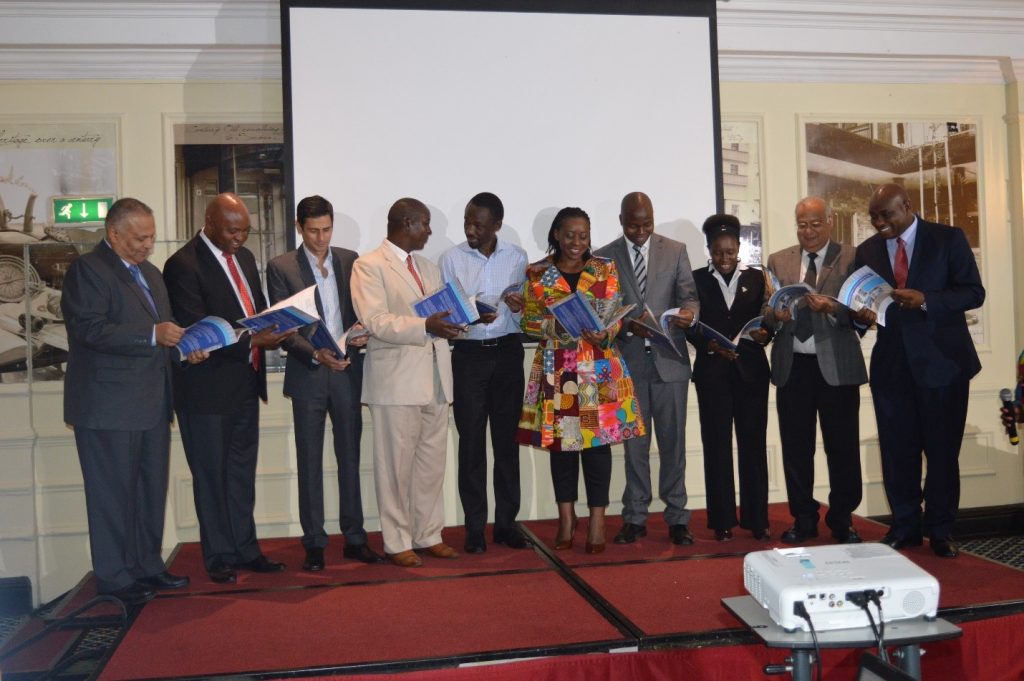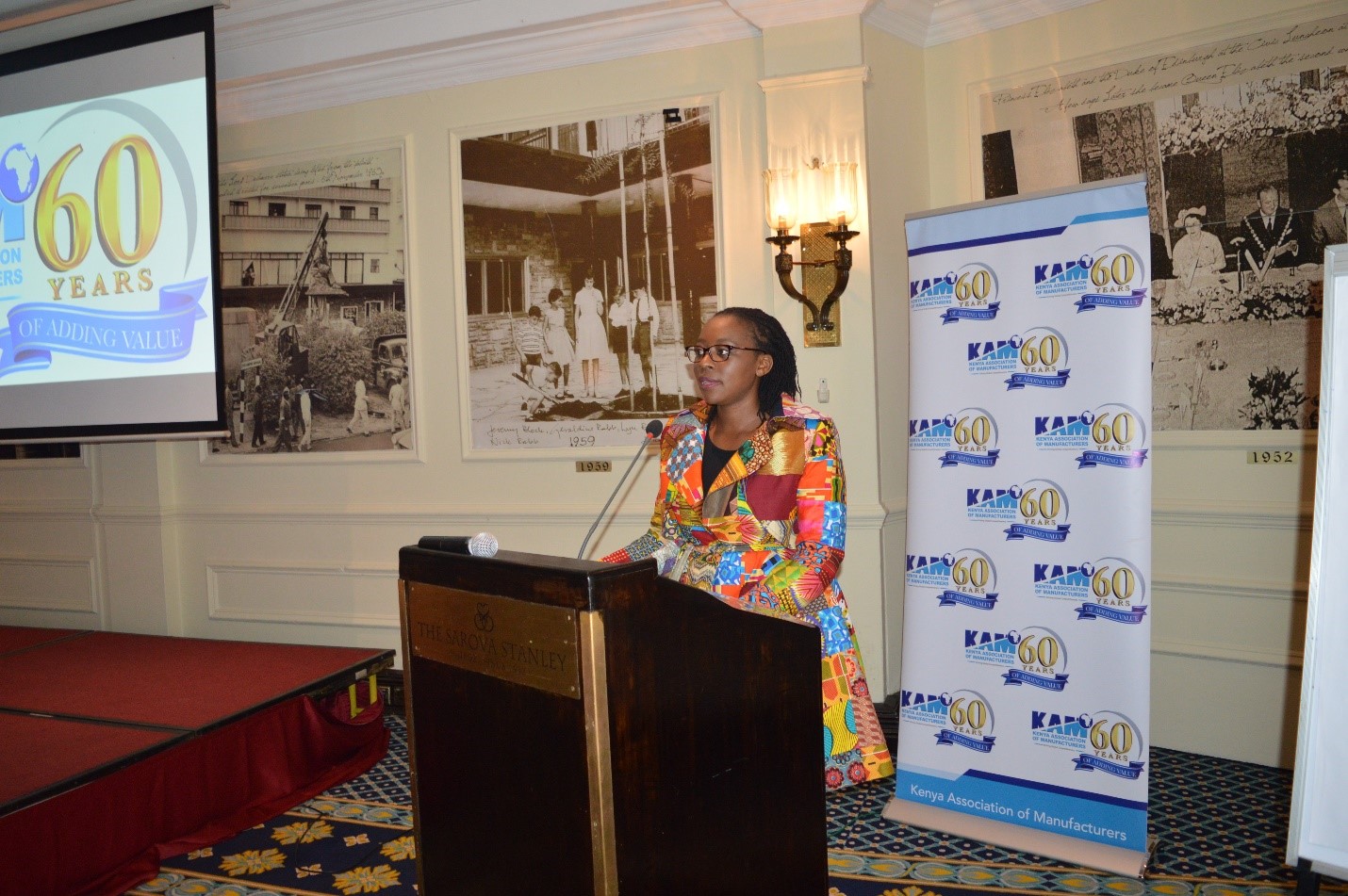Manufacturers Meet to Discuss National Budget Wins and Losses

The proposed 2019/2020 budget indicates that manufacturers are among the beneficiaries with the biggest allocations.
The government of Kenya, through the budget, has made tremendous efforts to address issues affecting the sector.
Some of these issues include unfair competition from imports, the illicit economy, and unpredictability in the policy and regulatory environment. These have been done with the objective to spur industry productivity and achieve the intended 15% GDP contribution by 2022.
Speaking at the Kenya Association Manufacturers Budget Seminar 2019, KAM CEO Ms Phyllis Wakiaga noted that the 2019/2020 budget has made noteworthy strides to support critical policies to drive the economy and improve the competitiveness of the manufacturing sector.
“The 2019/2020 Budget Statement proposes policies that are geared towards reigniting the manufacturing sector’s growth and development. The reduction of Import Development Fee (IDF) on raw materials and intermediate goods from 2 percent to 1.5 percent and increase of IDF on finished goods from 2 percent to 3.5 percent will reduce the cost of imported raw materials, thus improving the competitiveness of local manufacturers against finished imports. The increment of Railway Development Levy (RDL) for finished products from 1.5 percent to 2 percent will also cushion manufacturers against imported finished goods,” said Ms Wakiaga.
Ms Wakiaga further stated that the commitment by the National Treasury to adjust the VAT refund formula which has been a deterrent to exports to ensure full recovery of the portion of input tax relating to zero-rated supplies, will incentivize Kenya’s exports and improve liquidity for manufacturers.
Also in attendance was Mr Lawrence Lelei, Ministry of Industry, Trade and Cooperatives Representative, who noted that the government remains committed to boosting the industry’s competitiveness.
“In order to achieve rapid and inclusive economic growth and expand job opportunities, the government continues to implement prudent fiscal and monetary policies to achieve a low rate of inflation, low but sustainable interest rate and a competitive exchange rate to further improve the business climate for the private sector to thrive. The amendment of the Income Tax Act to provide for a deduction of 30 percent of the total electricity by manufacturers as rebate will reduce the cost of electricity to manufacturers by about 20 percent to make our products competitive in the region,” added Mr Lelei.
The Seminar reviewed manufacturers’ gains in the 2019/2020 National Budget Proposals and brought together industry stakeholders, economists and tax advisory experts.
KAM and Ernest and Young, East Africa also launched the Manufacturing Sector 2019/2020 Budget Newsletter, that seeks to outline the economic outlook of the National Budget proposals.
Mr Francis Kamau EY Tax Leader & Partner noted that the newsletter will provide an opportunity for manufacturers to proactively review the budget proposals and the expected impact on the manufacturing sector.
The proposed 2019/2020 budget indicates that manufacturers are among the beneficiaries with the biggest allocations.
The government of Kenya, through the budget, has made tremendous efforts to address issues affecting the sector.
Some of these issues include unfair competition from imports, the illicit economy, and unpredictability in the policy and regulatory environment. These have been done with the objective to spur industry productivity and achieve the intended 15 percent GDP contribution by 2022.

Speaking at the Kenya Association Manufacturers Budget Seminar 2019, KAM CEO Ms Phyllis Wakiaga noted that the 2019/2020 budget has made noteworthy strides to support critical policies to drive the economy and improve the competitiveness of the manufacturing sector.
“The 2019/2020 Budget Statement proposes policies that are geared towards reigniting the manufacturing sector’s growth and development. The reduction of Import Development Fee (IDF) on raw materials and intermediate goods from 2 percent to 1.5 percent and increase of IDF on finished goods from 2 percent to 3.5 percent will reduce the cost of imported raw materials, thus improving the competitiveness of local manufacturers against finished imports. The increment of Railway Development Levy (RDL) for finished products from 1.5 percent to 2 percent will also cushion manufacturers against imported finished goods,” said Ms Wakiaga.
Ms Wakiaga further stated that the commitment by the National Treasury to adjust the VAT refund formula which has been a deterrent to exports to ensure full recovery of the portion of input tax relating to zero-rated supplies, will incentivize Kenya’s exports and improve liquidity for manufacturers.
READ ALSO: KAM Launches Manufacturing Priority Agenda 2019
Also in attendance was Mr Lawrence Lelei, Ministry of Industry, Trade and Cooperatives Representative, who noted that the government remains committed to boosting the industry’s competitiveness.
“In order to achieve rapid and inclusive economic growth and expand job opportunities, the government continues to implement prudent fiscal and monetary policies to achieve a low rate of inflation, low but sustainable interest rate and a competitive exchange rate to further improve the business climate for the private sector to thrive. The amendment of the Income Tax Act to provide for a deduction of 30 percent of the total electricity by manufacturers as rebate will reduce the cost of electricity to manufacturers by about 20 percent to make our products competitive in the region,” added Mr Lelei.
The Seminar reviewed manufacturers’ gains in the 2019/2020 National Budget Proposals and brought together industry stakeholders, economists and tax advisory experts.
KAM and Ernest and Young, East Africa also launched the Manufacturing Sector 2019/2020 Budget Newsletter, that seeks to outline the economic outlook of the National Budget proposals.
Mr Francis Kamau EY Tax Leader & Partner noted that the newsletter will provide an opportunity for manufacturers to proactively review the budget proposals and the expected impact on the manufacturing sector.
The proposed 2019/2020 budget indicates that manufacturers are among the beneficiaries with the biggest allocations.
The government of Kenya, through the budget, has made tremendous efforts to address issues affecting the sector.
Some of these issues include unfair competition from imports, the illicit economy, and unpredictability in the policy and regulatory environment. These have been done with the objective to spur industry productivity and achieve the intended 15 percent GDP contribution by 2022.
Speaking at the Kenya Association Manufacturers Budget Seminar 2019, KAM CEO Ms Phyllis Wakiaga noted that the 2019/2020 budget has made noteworthy strides to support critical policies to drive the economy and improve the competitiveness of the manufacturing sector.
“The 2019/2020 Budget Statement proposes policies that are geared towards reigniting the manufacturing sector’s growth and development. The reduction of Import Development Fee (IDF) on raw materials and intermediate goods from 2 percent to 1.5 percent and increase of IDF on finished goods from 2 percent to 3.5 percent will reduce the cost of imported raw materials, thus improving the competitiveness of local manufacturers against finished imports. The increment of Railway Development Levy (RDL) for finished products from 1.5 percent to 2 percent will also cushion manufacturers against imported finished goods,” said Ms Wakiaga.
Ms Wakiaga further stated that the commitment by the National Treasury to adjust the VAT refund formula which has been a deterrent to exports to ensure full recovery of the portion of input tax relating to zero-rated supplies, will incentivize Kenya’s exports and improve liquidity for manufacturers.
Also in attendance was Mr Lawrence Lelei, Ministry of Industry, Trade and Cooperatives Representative, who noted that the government remains committed to boosting the industry’s competitiveness.
“In order to achieve rapid and inclusive economic growth and expand job opportunities, the government continues to implement prudent fiscal and monetary policies to achieve a low rate of inflation, low but sustainable interest rate and a competitive exchange rate to further improve the business climate for the private sector to thrive. The amendment of the Income Tax Act to provide for a deduction of 30 percent of the total electricity by manufacturers as rebate will reduce the cost of electricity to manufacturers by about 20 percent to make our products competitive in the region,” added Mr Lelei.
The Seminar reviewed manufacturers’ gains in the 2019/2020 National Budget Proposals and brought together industry stakeholders, economists and tax advisory experts.
KAM and Ernest and Young, East Africa also launched the Manufacturing Sector 2019/2020 Budget Newsletter, that seeks to outline the economic outlook of the National Budget proposals.
Mr Francis Kamau EY Tax Leader & Partner noted that the newsletter will provide an opportunity for manufacturers to proactively review the budget proposals and the expected impact on the manufacturing sector.
READ ALSO: KAM Welcomes CBK’s Decision to Introduce New Generational Notes
About Soko Directory Team
Soko Directory is a Financial and Markets digital portal that tracks brands, listed firms on the NSE, SMEs and trend setters in the markets eco-system.Find us on Facebook: facebook.com/SokoDirectory and on Twitter: twitter.com/SokoDirectory
- January 2025 (119)
- February 2025 (191)
- March 2025 (212)
- April 2025 (193)
- May 2025 (161)
- June 2025 (157)
- July 2025 (227)
- August 2025 (107)
- January 2024 (238)
- February 2024 (227)
- March 2024 (190)
- April 2024 (133)
- May 2024 (157)
- June 2024 (145)
- July 2024 (136)
- August 2024 (154)
- September 2024 (212)
- October 2024 (255)
- November 2024 (196)
- December 2024 (143)
- January 2023 (182)
- February 2023 (203)
- March 2023 (322)
- April 2023 (297)
- May 2023 (267)
- June 2023 (214)
- July 2023 (212)
- August 2023 (257)
- September 2023 (237)
- October 2023 (264)
- November 2023 (286)
- December 2023 (177)
- January 2022 (293)
- February 2022 (329)
- March 2022 (358)
- April 2022 (292)
- May 2022 (271)
- June 2022 (232)
- July 2022 (278)
- August 2022 (253)
- September 2022 (246)
- October 2022 (196)
- November 2022 (232)
- December 2022 (167)
- January 2021 (182)
- February 2021 (227)
- March 2021 (325)
- April 2021 (259)
- May 2021 (285)
- June 2021 (272)
- July 2021 (277)
- August 2021 (232)
- September 2021 (271)
- October 2021 (304)
- November 2021 (364)
- December 2021 (249)
- January 2020 (272)
- February 2020 (310)
- March 2020 (390)
- April 2020 (321)
- May 2020 (335)
- June 2020 (327)
- July 2020 (333)
- August 2020 (276)
- September 2020 (214)
- October 2020 (233)
- November 2020 (242)
- December 2020 (187)
- January 2019 (251)
- February 2019 (215)
- March 2019 (283)
- April 2019 (254)
- May 2019 (269)
- June 2019 (249)
- July 2019 (335)
- August 2019 (293)
- September 2019 (306)
- October 2019 (313)
- November 2019 (362)
- December 2019 (318)
- January 2018 (291)
- February 2018 (213)
- March 2018 (275)
- April 2018 (223)
- May 2018 (235)
- June 2018 (176)
- July 2018 (256)
- August 2018 (247)
- September 2018 (255)
- October 2018 (282)
- November 2018 (282)
- December 2018 (184)
- January 2017 (183)
- February 2017 (194)
- March 2017 (207)
- April 2017 (104)
- May 2017 (169)
- June 2017 (205)
- July 2017 (189)
- August 2017 (195)
- September 2017 (186)
- October 2017 (235)
- November 2017 (253)
- December 2017 (266)
- January 2016 (164)
- February 2016 (165)
- March 2016 (189)
- April 2016 (143)
- May 2016 (245)
- June 2016 (182)
- July 2016 (271)
- August 2016 (247)
- September 2016 (233)
- October 2016 (191)
- November 2016 (243)
- December 2016 (153)
- January 2015 (1)
- February 2015 (4)
- March 2015 (164)
- April 2015 (107)
- May 2015 (116)
- June 2015 (119)
- July 2015 (145)
- August 2015 (157)
- September 2015 (186)
- October 2015 (169)
- November 2015 (173)
- December 2015 (205)
- March 2014 (2)
- March 2013 (10)
- June 2013 (1)
- March 2012 (7)
- April 2012 (15)
- May 2012 (1)
- July 2012 (1)
- August 2012 (4)
- October 2012 (2)
- November 2012 (2)
- December 2012 (1)

